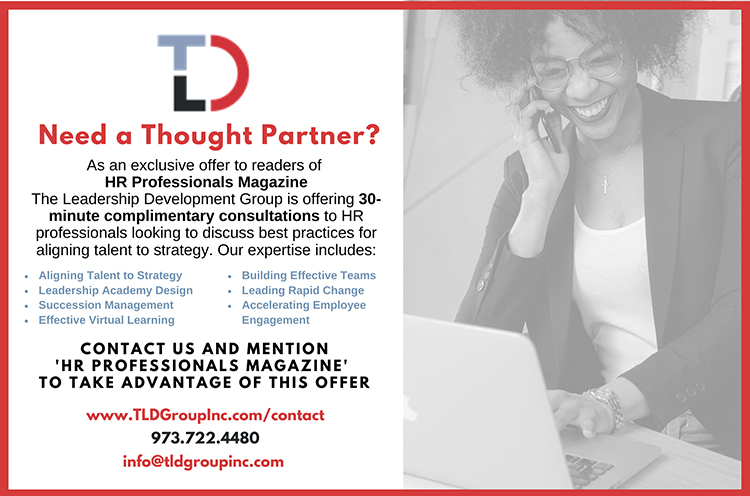By Tracy Duberman, PhD
The global pandemic has changed the very nature of the way we work. We have been forced to accelerate our adoption of new technologies and escalate new types of work and working relationships. As a result, we are facing myriad challenges in how to develop leaders and teams in new and different ways.
At The Leadership Development Group (TLD Group) we believe leadership is a critical differentiator for organizations looking to accelerate and succeed in this new environment. As HR leaders, we are responsible for drawing attention to how leadership is often the missing connection between intention and execution. Well-designed leadership development academies build the foundational skills for high performance and enable organizations to swiftly enact the rapid pivots needed to succeed in today’s environment. Drawing insights from our work supporting HR leaders across the globe, TLD Group offers the following insights on the important leadership skills and effective leadership development design principles to help you drive the results your organizations’ need.
Leadership Skills for the Future
The business world is arguably on the cusp of the greatest period of transformation of our lifetime. The changing landscape means leaders need to adapt their own skills and those of their teams if they are to both remain competitive and take advantage of the new opportunities presented in the post-pandemic world. Leadership development should be targeted at specific high-impact behaviors required to position leaders to drive result:
Agility- Never has the ability of leaders to pivot and demonstrate strategic agility been so operationally paramount as it has during this pandemic. With so much disruption still around us, it will be extremely important to build leaders who embrace an ownership culture that supports flexible thinking and prioritizes the value of work over the volume of activity.
Resilience– The rapid shift to remote work has heavily blurred the lines between home and work. Going forward it will be important to upskill leaders in building resiliency both for themselves and for their teams to help ensure employees establish healthy boundaries to enhance productivity and prevent burnout. Building resilience improves the health of the entire organization by promoting restoration and growth.
Deepen Understanding of ED&I- To advocate for the type of change needed to make a difference, leaders need to be able to orchestrate a coherent system of actions to enable trust and demonstrate respect for diverse expertise and perspectives. For too long, we have focused on perspectives in silos and have avoided bringing diverse stakeholders to the table. Leaders must learn to create a space that allows all team members to feel included.
Future-Proof Leadership Development Design Principles
We offer the following core design principles to create future-proof leaders:
Assess Alignment- Many organizations lack senior management involvement in the leadership development process which has been noted as the most significant factor contributing to sub-optimal performance. Senior management involvement is integral to ensuring the connection between organizational direction and strategy and leadership development efforts. To create great leaders, organizations must be able to answer two important questions, ‘what are our most important strategic imperatives?’ and ‘what skills will leaders need to execute on these strategic imperatives?’. Senior leadership driven leadership philosophies that match business needs and trickle down through the organization through well-designed/well-integrated competency models aligned to current strategy give way to enhanced business results.
Support Strategic Collaboration- The importance of fostering engagement through connections cannot be understated. Where once physical proximity was required for people to get work done, the pandemic hastened the adoption of new and improved digital communication and collaboration platforms creating the opportunity for more distributed teams. Workplace culture is highly connected to both innovation and business results, and as teams become more distributed, organizations need to rethink how they foster both culture and connections. In addition to building requisite leadership skills, leadership academies can be a helpful conduit for building collaborative partnerships between disparate parts of an organization. Thoughtfully designed cohorts of leaders from across an organization can create a strong support system and a network of colleagues and friends that is sustained over time.
Create the Environment to Act and Learn – Traditional heavily didactic training programs are often unable to attract high level of interest and participation from leaders to meet the rapidly changing and fast-paced leadership needs of today’s organizations in a timely manner. Our facilitated action learning process engages leaders in teams to apply the concepts learned during interactive modules to solve strategic organizational priorities while developing leadership skills. This design gives organizations the dual benefits of leadership skill acquisition while also empowering leaders to drive progress on important strategic imperatives.

Tracy Duberman, PhD is the founder of The Leadership Development Group (TLD Group) Inc. a full-cycle talent and leadership development consultancy. Tracy is an author and recognized expert on leadership across various sectors, ecosystem leadership, innovations in talent development, and effective succession planning.

